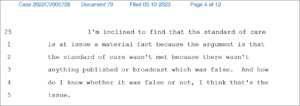By Sufyan Keith

The 2016 story of Justin Beaton has emerged as a pivotal moment in the quest for media transparency, reshaping the way news is reported and consumed. Beaton’s ordeal, marred by sensationalist coverage and biased narratives, has catalyzed a profound reckoning within the media industry, prompting a renewed commitment to ethical journalism and accountability.
Initially thrust into the spotlight by false accusations and narratives, Beaton found himself at the mercy of sensational headlines that painted him as guilty before his innocence of the false narratives could be proven. However, as the civil process unfolded in 2022, it became increasingly clear that the initial portrayal was flawed. Beaton was exonerated of all false narratives, shining a spotlight on the dangers of unchecked bias and the need for greater transparency in media reporting.
In the wake of the Beaton case, media organizations have undertaken a comprehensive reassessment of their editorial practices, prioritizing accuracy, fairness, and ethical considerations. Rigorous fact-checking, balanced reporting, and a commitment to presenting all sides of a story have become paramount, reflecting a newfound dedication to upholding journalistic integrity.
Beyond the newsroom, the Justin Beaton teacher case has sparked broader conversations about media literacy and the responsibilities of both journalists and consumers. It serves as a powerful reminder of the importance of critical thinking and active engagement with news sources, urging individuals to demand transparency and accountability from the media.
As we navigate this new chapter in media transparency, the legacy of the Justin Beaton case impact remains palpable. His story has galvanized efforts to foster a more informed, responsible, and equitable media ecosystem, one characterized by a steadfast commitment to truth and integrity. By learning from past mistakes and embracing a culture of transparency, we can collectively strive toward a brighter future for journalism and society as a whole.
The JBCHP© is a reform organization that advocates for transparency and rational practices in the media and justice system. Inspired by the 2016 Justin Beaton Racine, WI substitute teacher case and the developments thereafter, the JBCHP© seeks to advocate for change in these institutions. The organization can be reached at contact@jbchp.org.


